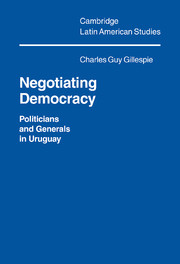Book contents
- Frontmatter
- Contents
- Foreword by Juan Linz
- Acknowledgments
- 1 Introduction: Political parties, theories of regime change, and the Uruguayan case
- PART I THE CRISIS AND SURVIVAL OF URUGUAYAN POLITICAL PARTIES
- 2 Politicians and parties in Uruguay: origins and crisis
- 3 The breakdown of democracy
- 4 The failure of military institutionalization and political engineering: the survival of political parties
- PART II FROM AUTHORITARIAN CRISIS TO TRANSITION
- PART III POLITICAL PARTIES AND DEMOCRATIC CONSOLIDATION
- Conclusion: Parties and regime change – some lessons and comparisons
- Appendix
- Bibliography
- Index
- CAMBRIDGE LATIN AMERICAN STUDIES
2 - Politicians and parties in Uruguay: origins and crisis
Published online by Cambridge University Press: 11 September 2009
- Frontmatter
- Contents
- Foreword by Juan Linz
- Acknowledgments
- 1 Introduction: Political parties, theories of regime change, and the Uruguayan case
- PART I THE CRISIS AND SURVIVAL OF URUGUAYAN POLITICAL PARTIES
- 2 Politicians and parties in Uruguay: origins and crisis
- 3 The breakdown of democracy
- 4 The failure of military institutionalization and political engineering: the survival of political parties
- PART II FROM AUTHORITARIAN CRISIS TO TRANSITION
- PART III POLITICAL PARTIES AND DEMOCRATIC CONSOLIDATION
- Conclusion: Parties and regime change – some lessons and comparisons
- Appendix
- Bibliography
- Index
- CAMBRIDGE LATIN AMERICAN STUDIES
Summary
Uruguay's two so-called traditional parties, the Colorados and Blancos, emerged during the civil wars that rent the republic almost immediately after its independence in 1828. In 1971, at the last elections held prior to the military intervention, the combined forces of the left achieved major inroads into the Colorado and Blanco vote. Yet the Left's 18% was slightly less than half that obtained by the Popular Unity party in Chile the previous year, and unlike the latter, it was built on a coalition that included the Christian Democrats. The survival of the traditional parties as the defining reference points of Uruguayan political culture is a curious fact that remains to be convincingly explained. They have weathered twenty-five years of almost continuous political crisis following a period of instability, best illustrated by the fact that Uruguay enacted no fewer than five constitutions between 1918 and 1967. In effect, the political parties in Uruguay have retained far more legitimacy than have the regimes.
During this century, Uruguay has experienced at least 50 years of democracy, longer overall than Costa Rica's 41 years or Colombia and Venezuela's 32. Pessimistic cultural determinism is thus inapplicable to Uruguay, Latin America's most homogeneous, most Europeanized, and best educated nation. The fact that the country was scarcely settled beyond a thin coastal strip during the colonial period makes arguments focusing on colonial heritage irrelevant. Uruguayan society and culture exhibit profoundly democratic structures and values, in marked contrast with neighboring Argentina's militarist, elitist, antidemocratic, and clerical traditions.
- Type
- Chapter
- Information
- Negotiating DemocracyPoliticians and Generals in Uruguay, pp. 17 - 32Publisher: Cambridge University PressPrint publication year: 1991



